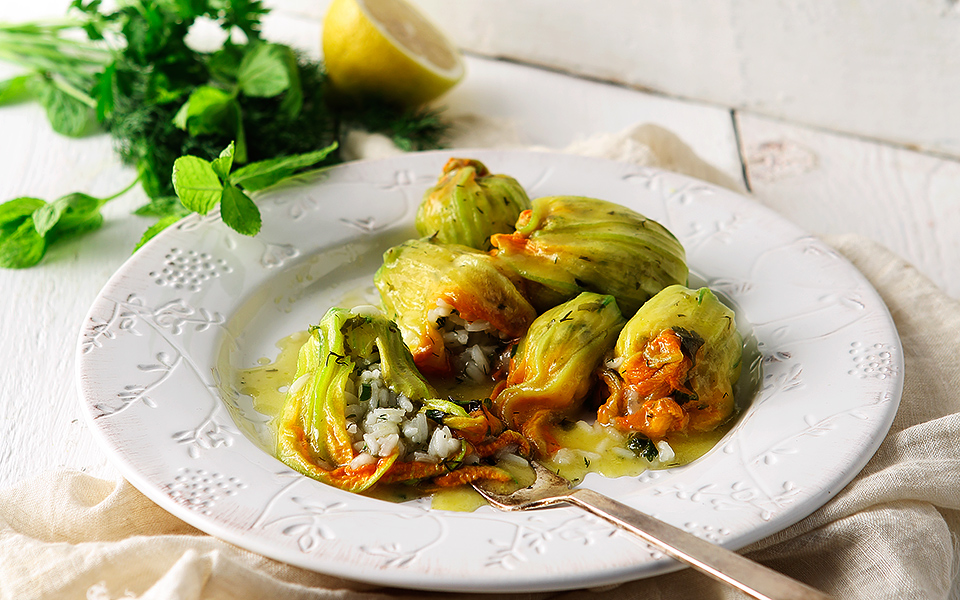Ios – Stuffed Zucchini Flowers
‘Tsimetia‘ are what the residents of Ios call stuffed zucchini flowers, an inspired example of frugal homemaking where nothing goes to waste. An exquisite treat made with the freshest zucchini flowers (ideally picked early in the morning) this dish requires a gentle touch. Filling and sealing the delicate blooms without damaging them requires no small measure of skill, as does placing them in the pot such that they do not burst while cooking. On Ios the filling is customarily made with rice, plenty of onions, dill, parsley and spearmint. The end result is a magnificently caramelized, aromatic vegetarian dish, with a delicate sweetness adding to the zucchini flavor. Incomparably refined, they can be found at a few tavernas on the island, mainly in spring and summer when zucchini flowers are in season.
Lesvos: Sardines from Kalloni Bay
With the island shaped like a butterfly, the two main lobes of Lesbos wrap around the bay of Kalloni, an expanse of water that resembles an inland lake, connecting to the Aegean sea through a narrow channel. This unique geography makes Kalloni an exceptionally rich fish hatchery particularly for sardines. The small, salty fish caught here, known locally as ‘papalina’ are considered some of the best in Greece. Customarily grilled on a charcoal barbecue, they make a delicious seafood meze and are a fantastic accompaniment to Lesvos’s other famous product: ouzo. Short, chubby and rich in omega-3 fatty acids, they are best served with a drizzle of high-quality local olive oil and a few drops of lemon. Fresh sardines are only available during certain times of the year, however the locals also cure them in salt to ensure they are never off the menu. You will find the delicacies (salted and/or fresh) in most tavernas on the island.
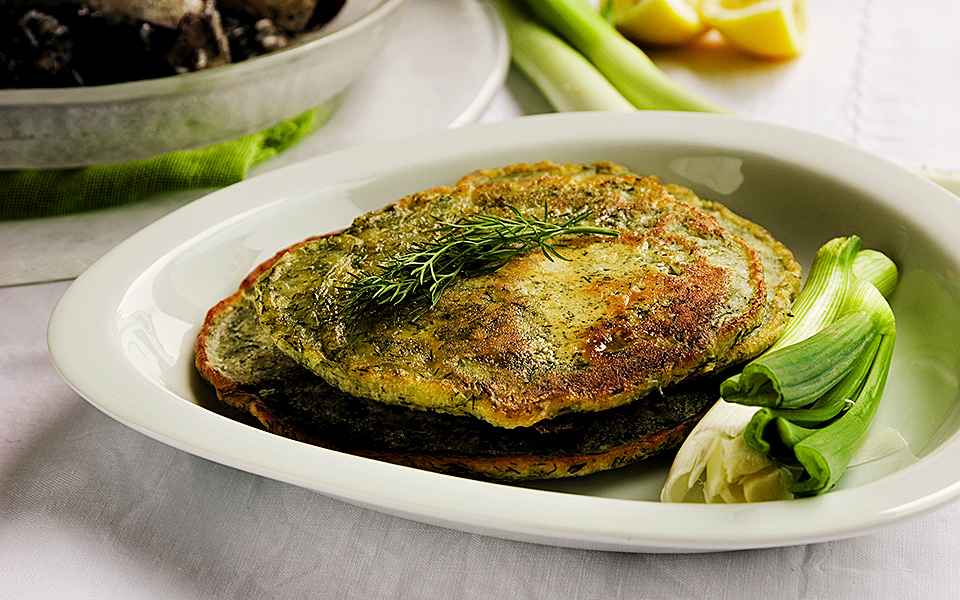
© Photo: George Drakopoulos, Food Styling: Tina Webb
CHIOS – Malathropita
Wild fennel grows almost everywhere in Chios’s salty soil and this incredible herb is used in many local recipes for its aniseed-like aroma. But in malathropita (fennel pie), the herb is the main event. A sublime meze that pairs well with the local mastic-flavored ouzo. With a batter flavored with plenty of finely chopped fennel and fish roe (the latter setting the Chios version of the dish apart from those prepared elsewhere), the fennel pies are fried until light brown and crispy, and best eaten while still steaming hot.
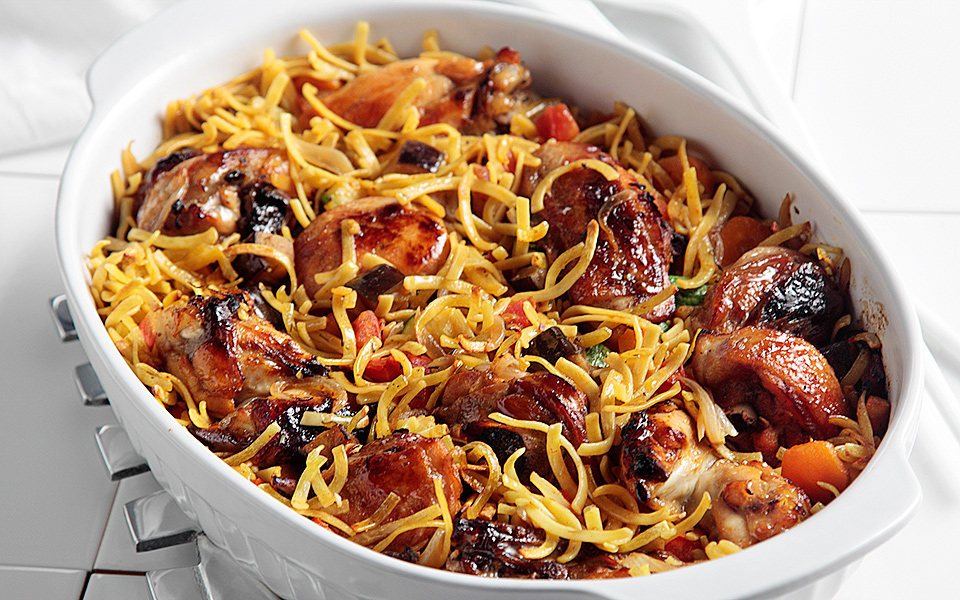
© Photo: George Drakopoulos, Food Styling: Tina Webb
LIMNOS – FLOMARIA
A type of egg noodle, flomaria are a product of this northern Aegean island’s rich tradition in grain cultivation. Historical references show that Limnos’s prized grains were once exported to ancient Athens. Later, the island became a wheat supplier for Byzantine emperors. These traditional, small pieces of pasta can be thin, like broken spaghetti, or thicker, like standard egg noodles. They are traditionally prepared in the summer so they can be dried quickly and naturally in cellars. Groups of women traditionally gather together and whip up large quantities of dough before beginning the skilled work of cutting up the noodles. Flomaria provide a hearty base for meals to satisfy an entire family; thanks to the eggs and sheep’s milk in the dough they are rich and flavorful. Flomaria are often eaten plain, topped with just a little grated cheese. But you should also try them in a casserole made with the tasty meat of a free-range rooster at one of the island’s many tavernas.
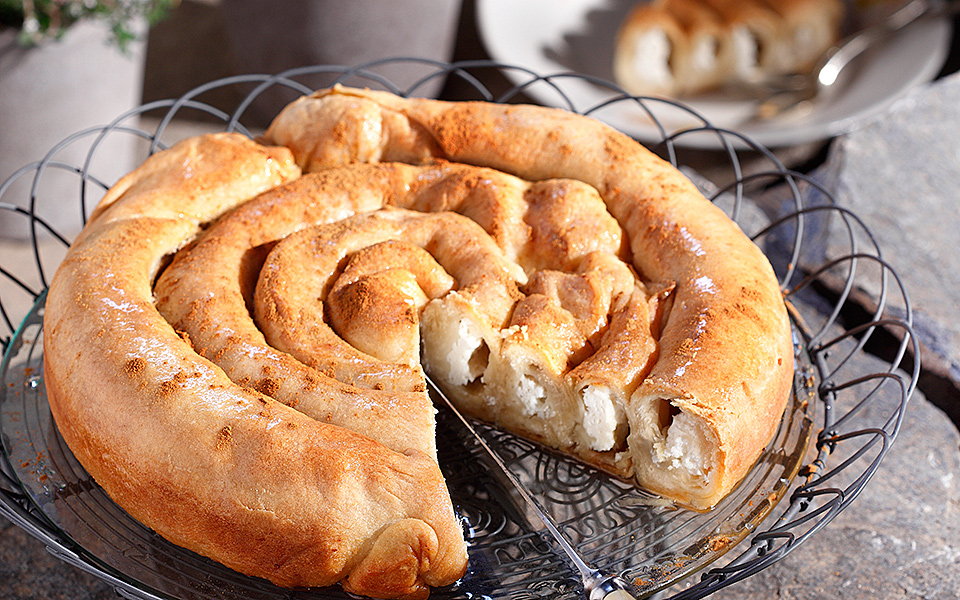
© Photo: George Drakopoulos, Food Styling: Tina Webb
SKOPELOS – CHEESE PIE
A little water, flour, oil and goat’s cheese is all that is needed to create the Greek cheese-pie miracle known as a ‘tyropita‘. Of course countless versions of cheese-pies exist throughout Greece, but the Skopelos variation is one of the most famous and most-loved, set apart by its trademark snail-like shape and the fact that it is fried in olive oil. For the filling locals will use good feta cheese when it is available, but may also use some local goat cheese in between the fine filo pastry sheets. The crispy filo, sharp and tangy cheese and high quality olive oil combine to make one of the most mouth-watering mainstays of the island’s cuisine. In some homes (traditionally the more affluent households) cooks would also add eggs to the filo dough to make it puffier and lighter. Others would add olive oil to the mix for a crispier result.Nowadays, you can find as many variations of the Skopelos cheese-pies as there are cooks preparing them. Perfect for breakfast, too!
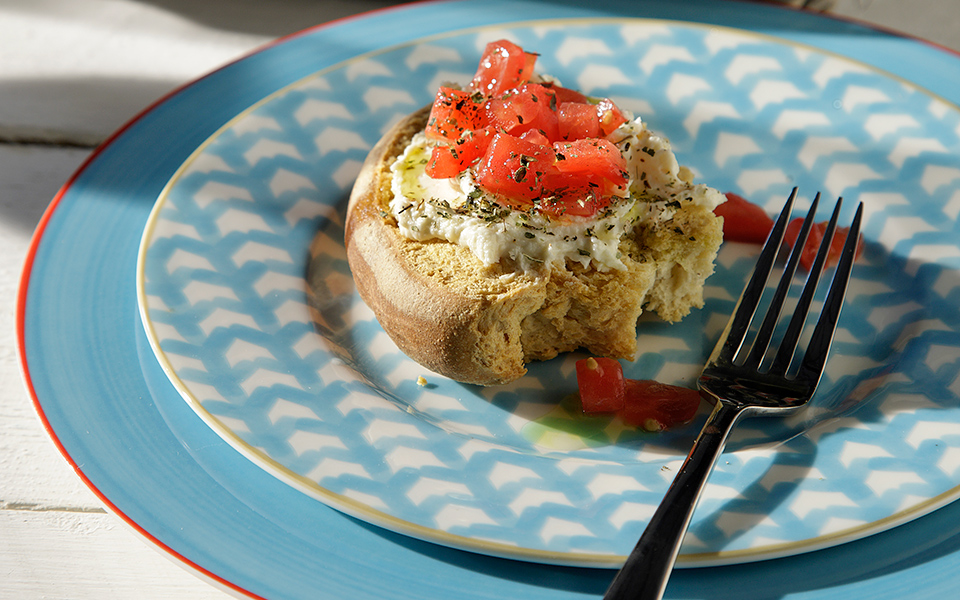
© Photo: George Drakopoulos, Food Styling: Tina Webb
MYΚΟΝΟS – MOSTRA
The famous windmills of Mykonos stand as a testament to the island’s long flour and bread-making tradition. A famous product of this heritage are the barley rusks locally known as ‘mostra‘ (meaning ‘display’). Today, the term does not refer just to the crispy rusks, but also to the way they are served – with a dollop ‘kopanisti‘, a locally produced salty and spicy cheese, together with a mound of finely chopped, juicy sweet tomatoes. Mostra are, therefore, what Mykonians use to showcase their specialty cheese. You will be sure to find offered this simple, light, but flavorful snack at many of the island’s restaurants.
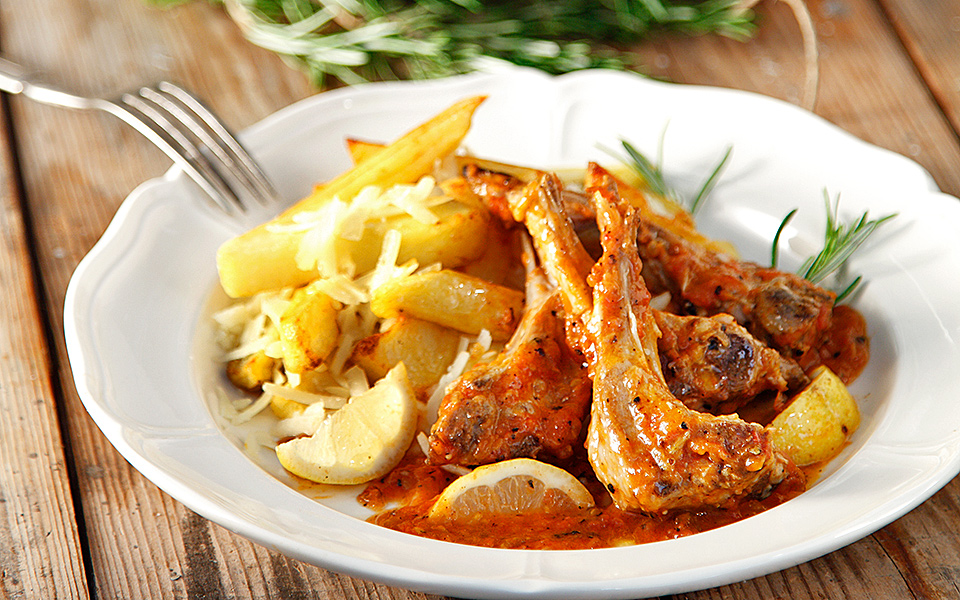
© Photo: George Drakopoulos, Food Styling: Tina Webb
AMORGOS – Patatato
Goats are plentiful on this rugged island, grazing freely on the wide variety of wild herbs that grow in the salty soil. Patatato is a dish that consists of honey-baked goat meat cooked in a tomato sauce with locally grown potatoes, spices and cinnamon. Traditionally it is prepared in large quantities in huge pots to celebrate the feast day of Aghia Paraskevi on July 25. An exquisite specialty, nowadays it is served in many of the tavernas and restaurants on the island throughout the year. A truly out-of-this-world dish not to be missed when on the island.
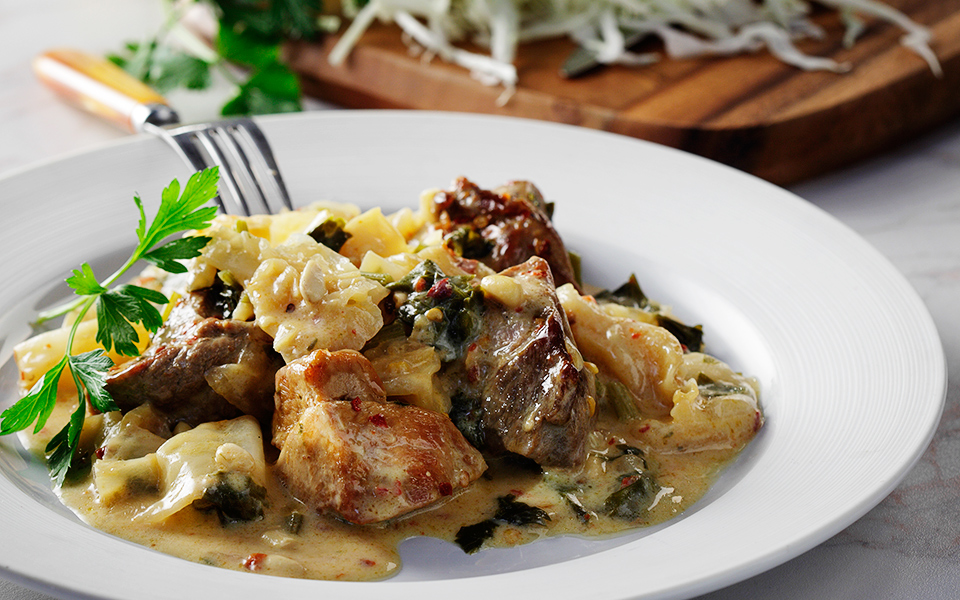
© Photo: George Drakopoulos, Food Styling: Tina Webb
IKARIA – Pork with cabbage & kale
Ikaria’s soil may be relatively infertile but nevertheless more than 75 types of green vegetables thrive on the island, adapted to the microclimate. One of these kale, the leafy vegetable that has recently seen it’s popularity explode, making its way into haute cuisine menus around the world. In Ikaria, cabbage and kale have always been a staple part of the local’s diet and are eaten almost all year round. Bursting with antioxidants, these ingredients may also contribute to the Ikarian’s famed longevity. Traditionally on Christmas Day the normally frugal islanders prepare a rich, festive dish using kale, cabbage and pork produced from the ‘pig feast’ (an autumn celebration that still takes place on Ikaria and other islands). Today this dish can be found in many of the island’s tavernas that specialize in casseroles slow-cooked in the oven.

